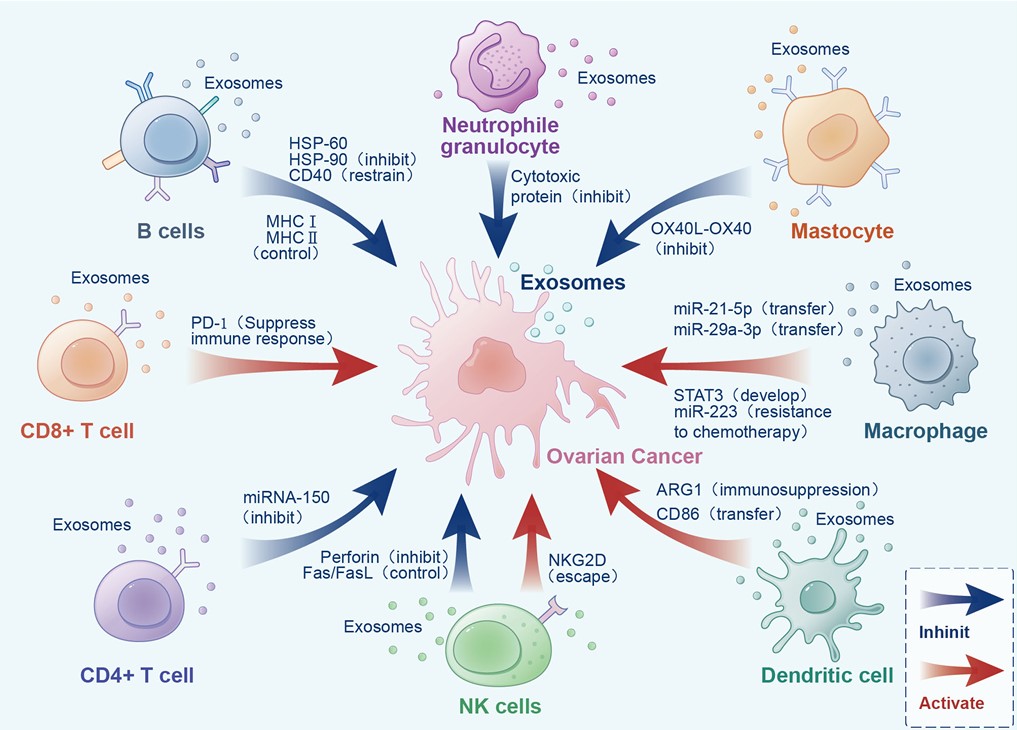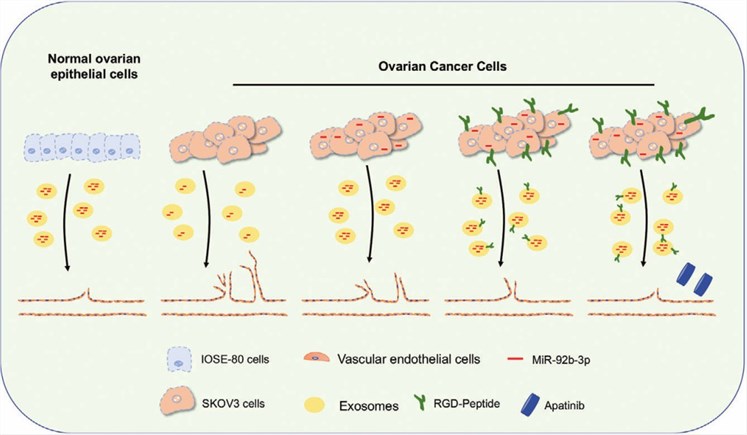Ovarian Cancer-Targeted Exosome Modification Service
Overview Services Features FAQs
The high ranking of gynecologic cancers makes it urgent to advance research on targeted intervention options for ovarian cancer (OC). With the targeted modification of exosomes and extensive research on various cancers including ovarian cancer, Creative Biolabs can provide clients with solutions and services for exosome modification targeting ovarian cancer.
Exosome Vector Superiority in Ovarian Cancer Management
The emerging role of exosomes in targeted drug delivery systems has been widely recognized, overcoming the shortcomings of traditional non-specific OC chemotherapeutic agents. Being involved in the horizontal transfer of substances and information between cells, exosomes are highly biocompatible natural nanocarriers. With superior biological barrier penetration and no adverse immunogenicity, exosomes play a distinct carrier advantage in cargo delivery and targeted therapy of ovarian cancer.
Targeted Exosome Modification Strategies for Ovarian Cancer at Creative Biolabs
1. Passive-targeted Exosome Modification Strategies
-
Ovarian cancer lesion areas with negatively charged vascular endothelial cells and higher vascular density, therefore, modifying exosomes with electrically neutral surface potential can avoid the phagocytic preference of the reticuloendothelial system for negatively charged particles and enhance the EPR effect in ovarian cancer.
-
Exosomes smaller than 400 nm in size are more likely to penetrate through pores in the vascular wall of lesions with a diameter of 400 nm compared to other nanomaterials.
-
Owing to the inherited endogenous components of the parent cells, exosomes carry a variety of chemokines, adhesion factors, and ligands on their membrane surface, which can exert targeting potential to anchor ovarian cancer cells. For example, cancer-derived exosomes from SKOV3 cells accumulate at a higher level of selectivity in mice with ovarian cancer compared to epithelial-derived exosomes, which is referred to as exosome homing.
Taken together, Creative Biolabs can provide modification and accentuation of targeted enrichment of exosomes in ovarian cancer by recommending suitable exosome donor cells and performing exosomal surface electrical and membrane modifications.
 Fig. 1 Bidirectional effects of exosomes from different sources in the ovarian tumor microenvironment.1
Fig. 1 Bidirectional effects of exosomes from different sources in the ovarian tumor microenvironment.1
2. Active-targeted Exosome Modification Strategies
-
Dendritic cell-derived exosomes after anchoring FSH-β specific peptide fragments activate T cells and exert significant killing power targeting ovarian cancer cells.
-
Given that VEGFR-3 is expressed in ovarian cancer neoplastic lymphatic vascular endothelial cells, peptide modifications with high-affinity binding to VEGFR-3 extracellular region proteins on the exosome membrane surface could result in targeted distribution of exosome-loaded cargo in ovarian cancer mice lesions.
-
The presence of estrogen receptors on ovarian cancer cells was predicted to be a potential target leading to the screening of the corresponding peptides and the engineered exosome modification. Creative Biolabs' phage display technology enables the screening and preparation of these peptides.
-
Exosomes modified with RGD peptide-penetrating peptides can interact with αvβ3 integrin receptors highly expressed on the surface of vascular epithelial cells, which facilitates the application of exosomes for anti-angiogenic therapy in carcinogenesis.
Creative Biolabs provides ligand-receptor-mediated active targeting solutions by modifying exosomal vectors with specific ligands for these targets, including detailed screening, synthesis, and verification of peptide targets.
 Fig. 2 DSPE-PEG2K-RGD-modified engineered exosomes produce anti-angiogenic effects in nude mice ovarian cancer model.2
Fig. 2 DSPE-PEG2K-RGD-modified engineered exosomes produce anti-angiogenic effects in nude mice ovarian cancer model.2
Features
-
Enhanced Payload Delivery: Modified exosomes are engineered to efficiently deliver therapeutic payloads to ovarian cancer cells, maximizing the therapeutic potential of loaded agents such as drugs or genetic material.
-
Minimized Immunogenicity: Through sophisticated modification techniques, we aim to minimize the immunogenic response of exosomes, ensuring prolonged circulation and improved therapeutic outcomes.
-
Optimized Pharmacokinetics: Our modifications are designed to improve the pharmacokinetic properties of exosomes, enhancing their stability, circulation time, and biodistribution for enhanced therapeutic effects.
FAQs
Q: What is the advantage of using targeted exosome modification for ovarian cancer research?
A: Targeted exosome modification offers several advantages over conventional therapies, including enhanced specificity for cancer cells, reduced off-target effects, and improved therapeutic payload delivery. This precision targeting can potentially increase therapeutic efficacy while minimizing adverse effects on healthy tissues.
Q: How are exosomes modified to target ovarian cancer cells?
A: Exosomes can be modified through various techniques, including surface engineering with specific ligands or antibodies that recognize receptors overexpressed on ovarian cancer cells. Additionally, genetic engineering approaches can be employed to load exosomes with therapeutic cargo or to alter their inherent properties for improved targeting and delivery.
Creative Biolabs has an extensive portfolio of exosome vector modification strategies, including both passive and active targeting, to increase the effective dose that is genuinely delivered to ovarian cancer lesions. Our specialized team is flexible in providing customized research services related to exosome modification targeting ovarian cancer. Please contact us to advance your project.
References
-
Gong, Xiangjin, et al. "Exosomes: A potential tool for immunotherapy of ovarian cancer." Frontiers in Immunology 13 (2023): 1089410. Under Open Access license CC BY 4.0, without modification.
-
Wang, Jiaying, et al. "Potential of peptide‐engineered exosomes with overexpressed miR‐92b‐3p in anti‐angiogenic therapy of ovarian cancer." Clinical and translational medicine 11.5 (2021): e425. Under Open Access license CC BY 4.0. The image was modified by revising the title.
For Research Use Only. Cannot be used by patients.
Related Services:

 Fig. 1 Bidirectional effects of exosomes from different sources in the ovarian tumor microenvironment.1
Fig. 1 Bidirectional effects of exosomes from different sources in the ovarian tumor microenvironment.1
 Fig. 2 DSPE-PEG2K-RGD-modified engineered exosomes produce anti-angiogenic effects in nude mice ovarian cancer model.2
Fig. 2 DSPE-PEG2K-RGD-modified engineered exosomes produce anti-angiogenic effects in nude mice ovarian cancer model.2









